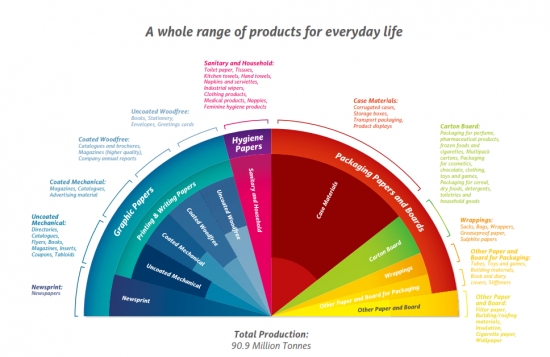Displaying items by tag: cepi
European paper industry unveils major investment agenda to drive towards its 2050 vision
CEPI foresees 40% more investment to transform industry and lead the low-carbon bioeconomy in Europe.
 At the 18th edition of annual event European Paper Week, CEPI’s new Director General SlyvainLhôte and its Chairman, Peter Oswald (CEO Mondi Group, Europe & International Division) outlined industry’s ambitious investment agenda towards achieving its 2050 vision of a low carbon, resource efficient bioeconomy.
At the 18th edition of annual event European Paper Week, CEPI’s new Director General SlyvainLhôte and its Chairman, Peter Oswald (CEO Mondi Group, Europe & International Division) outlined industry’s ambitious investment agenda towards achieving its 2050 vision of a low carbon, resource efficient bioeconomy.
Building on the roadmap it had laid out in 2011 industry reaffirms its vision of leading Europe’s bioeconomy transition towards 2050 by cutting its carbon footprint by 80% while creating more than 50% more added value.
“Investment will be the cornerstone of making this industry transformation happen in Europe“ said Sylvain Lhôte at the High Level Session at European Paper Week. We project the need for 40% more investment to transform our industry base and seize new market opportunities. This can happen in Europe if we align European policies, our research efforts and financing conditions. Our agenda goes against the gloom prevailing in so many industries. For CEPI, getting the conditions right to invest more in Europe will be the priority.
Industry currently invests €3 to €3.5 billion euro per year in Europe. The capital expenditure to deploy decarbonisation technologies in Europe and develop production of new bio-based products would require an additional €44 billon by 2050 or in other words 40% more than current levels.
The key findings of the roadmap review that CEPI experts carried out in 2016 are now available for consultation from stakeholders. The goal is to broaden the collective input of the document through seeking consultation with key stakeholders on enabling conditions for industry transformation and to table a revised roadmap early 2017. An online version of the roadmap can be consulted here.
For further information on our 2050 roadmap please contact Bernard de Galembert at This email address is being protected from spambots. You need JavaScript enabled to view it.
CEPI aisbl - The Confederation of European Paper Industries
The Confederation of European Paper Industries (CEPI) is a Brussels-based non-profit organisation regrouping the European pulp and paper industry and championing the industry’s achievements and the benefits of its products. Through its 18 member countries (17 European Union members plus Norway) CEPI represents some 505 pulp, paper and board producing companies across Europe, ranging from small and medium sized companies to multi-nationals, and 920 paper mills. Together they represent 23% of world production.
Website: http://www.cepi.org/
18th edition of European Paper Week opens with a renewed focus on innovation, investment and future skills
CEPI, the organisation representing the European paper industry has opened its 18th edition of its annual event European Paper Week welcoming nearly 350 movers and shakers from the across the European paper industry and the four corners of the globe.
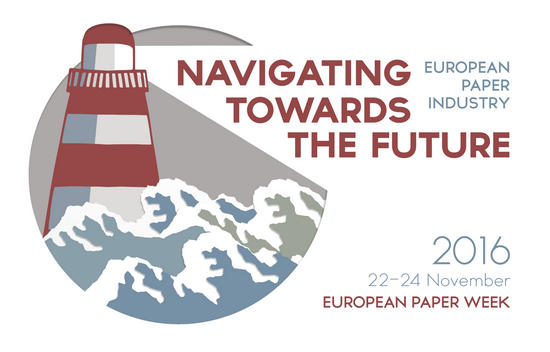 This year’s programme set the tone for its positive agenda ahead as we enter 2017. At this year’s event attendees will be provided with the opportunity to meet CEPI’s new Director General, Sylvain Lhôte as well as its Chairman, Peter Oswald (CEO Mondi Group, Europe & International Division).
This year’s programme set the tone for its positive agenda ahead as we enter 2017. At this year’s event attendees will be provided with the opportunity to meet CEPI’s new Director General, Sylvain Lhôte as well as its Chairman, Peter Oswald (CEO Mondi Group, Europe & International Division).
The highlight of this year’s event, the high-level session includes notable speakers such as Gideon Rachman, chief foreign affairs commentator of the Financial Times, Lucrezia Reichlin of the London Business School, Signe Ratso, Director, DG TRADE, the EIB as well as Moody’s. The discussion will reflect on global economic trends and the investment implications for the European paper industry.
As an indication of the strides forward industry has made on the innovation agenda this year’s event will open with ten young researchers showcasing their industry-changing ideas. Three of them will be in line for the prestigious global Blue Sky Innovation Award to be launched for the first time in 2017.
This will be complemented on Wednesday by a session dedicated to the 2017 prospects for the energy market and a joint session with our partners from RISI on the global market outlook ahead. During this discussion we will be joined by Innventia who will present their groundbreaking"Cellulose-Based Society" report.
On top of this together with our trade union partners Industriall we will discuss the need for policymakers to tip the balance in favour of supporting the skills and competences necessary for the bioeconomy transition. Most significantly we will address the outcome of European Commission study demonstrating the financial burden of EU regulations and the detrimental impact on industry’s ability to reinvest and to ensure industrial transformation happens in Europe.
Finally our new Director General will launch the discussion on the way forward for our 2050 Roadmap outlining industry’s vision to move forward on the path towards a low-carbon, circular bioeconomy by 2050 in Europe, for Europe. This roadmap will be immediately open for contributions from stakeholders.
Paper recycling in Europe now at 71.5% - exceeding voluntary commitment
Paper Recycling Chain exceeds its voluntary commitment
European Paper Recycling at 71.5% in 2015
The paper recycling rate in Europe reached an impressive 71.5% as announced by the European Recovered Paper Council (ERPC) in their final monitoring report for 2015. Compared to 2010, collection and recycling has increased by almost one million tonnes of paper. This is due in part to the excellent work of the ERPC.
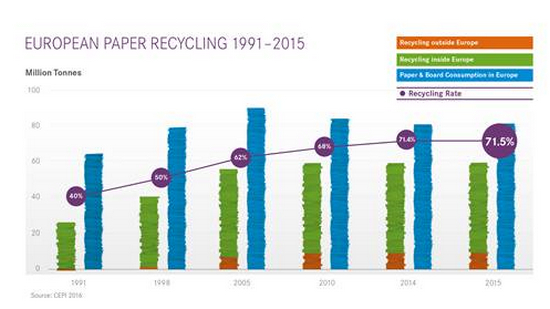
The 2015 European paper recycling rate of 71.5% is 1.5% higher than the target set by the ERPC in the 3rd European Declaration on Paper Recycling for the period 2010-2015. We are proud to report on the impressive work completed, following the pledge it first made in 2000 to expand paper recycling in Europe.
“The efforts of the ERPC perfectly complement EU policy on Circular Economy. The paper fibre loop can serve as the perfect model for circularity”, says ERPC Chairman Henri Vermeulen. “All 13 ERPC associations are proud to be part of a value chain ‘Made in Europe’, prolonging value creation and job opportunities”, he added.
In addition to the quantitative progress, a lot of qualitative work was done, particularly with initiatives to facilitate the recycling process and increase recycling activity. These notably include collection and applying ecodesign to paper products.
For the commitment period of 2011 to 2015, EY has independently verified the recycling rate calculations.Currently, a new ambitious commitment for 2016-2020 is being prepared. This will keep the industry moving on its path towards ever-higher recycling rates.
For more information, please contact the ERPC Secretariat, Ulrich Leberle, at
+32 2 627 49 23, This email address is being protected from spambots. You need JavaScript enabled to view it. or visit www.paperforrecycling.eu
- Download link for the 2015 Monitoring Report: http://www.paperforrecycling.eu/uploads/Modules/Publications/MonitoringReport2015final.pdf
- The European Recovered Paper Council (ERPC) was a self-initiative set up in November 2000 to monitor progress towards meeting the paper recycling targets set out in the 2000 European Declaration on Paper Recycling. Since then the commitments in the Declaration are renewed every five years. In 2011 the ERPC committed itself to meeting and maintaining both a voluntary recycling rate target of 70% in the EU27 plus Switzerland and Norway by 2015 as well as reaching qualitative targets in areas such as waste prevention, ecodesign, and R&D.
- As of 2016, ERPC’s signatories are ACE, CEPI, CITPA, EMFA, ERPA, ETS, FEPE, INGEDE, INTERGRAF. The supporters are AFERA, EuPIA, FINAT and RADTECH Europe. The European Commission (DG Environment and DG Grow) are permanent observers to ERPC.
ETS Review: European paper industry commends rejection of tiered approach
Today’s vote in the European Parliament marks a major stepping stone for the ETS review.
“This message reads loud and clear:
NO to a tiered approach on carbon leakage and YES to a dynamic and predictable benchmark’s reduction”
says Nicola Rega, Climate Change and Energy Director representing the Confederation of European Paper Industries (CEPI).
 The proposed flexibility in setting the auction share together with proposed solutions to help member states with compensation for indirect carbon costs and the wider-ranging fund for innovation are also welcomed by our industry.
The proposed flexibility in setting the auction share together with proposed solutions to help member states with compensation for indirect carbon costs and the wider-ranging fund for innovation are also welcomed by our industry.
We recognise the efforts made towards reaching a broad political agreement embracing almost all the political groups. This is a very positive signal as it demonstrates the strong consensus behind this vote. We fully congratulate the rapporteur, Frederik Federley and shadow rapporteurs Esther de Lange, Edouard Martin and Hans-Olaf Henkel for their commitment to achieving a common position.
Although these are positive developments, more work needs to be done to address the text’s shortcomings, particularly on benchmarks, the impact of the cross-sectoral correction factor and on effective compensation for indirect costs across Europe.
A significant investment challenge lies ahead for European manufacturing industry to transform its production base and regain competitiveness. We will constructively engage with policy-makers to ensure industry’s viability and that the ETS rewards low-carbon investments. We urge the ENVI Committee to seize the opportunity to build upon ITRE’s lead and to put the ETS on a pro-investment track.
CEPI aisbl - The Confederation of European Paper Industries
The Confederation of European Paper Industries (CEPI) is a Brussels-based non-profit organisation regrouping the European pulp and paper industry and championing the industry’s achievements and the benefits of its products. Through its 18 member countries (17 European Union members plus Norway) CEPI represents some 505 pulp, paper and board producing companies across Europe, ranging from small and medium sized companies to multi-nationals, and 920 paper mills. Together they represent 23% of world production.
European Paper Week 2016 registration is open
European Paper Industry – Navigating towards the future
The Confederation of European Paper Industries (CEPI) has kicked off registration for European Paper Week (EPW), taking place on 22-24 November in Brussels. The event will offer for the 18th time a unique opportunity to liaise with the movers and shakers in the European paper industry. This year, it promises exciting new features: more networking opportunities with a welcome cocktail, a new location at the Radisson Blu Royal Hotel in Brussels city centre and a focus on the key topic of future employee skills and education, to name but a few.

“European Paper Industry - Navigating towards the future” will be the overriding theme. Our sector is navigating in stormy weather, facing a significantly challenging political and economic climate. However, it has a clear vision for 2050. Indeed, EPW will see the launch of a reviewed 2050 Roadmap, examining 80% decarbonisation with 50% added value, five years after the highly-popular first edition.
CEPI is honoured to have Financial Times chief foreign affairs commentator Gideon Rachman, as the moderator of the main EPW session. He and London Business school professor Lucrezia Reichlin will give valuable insights on the global economy and its impact on our industry. In addition, we will look deeply into the means to ensure the sector receives the necessary future investments.
This year’s event will also be the first for recently-appointed CEPI Director General, Sylvain Lhôte, at the helm of the association since the beginning of September. With many years of experience in Brussels and other industries and a newcomer in the sector, Sylvain is ready to make a mark, starting at EPW.
A detailed programme and registration information are available at www.cepi.org/epw. If you need any further information don’t hesitate to email us at This email address is being protected from spambots. You need JavaScript enabled to view it..
The event will be held in conjunction with the PPI 2016 Awards, taking place on 21 November.
European Paper Week is one of the most important and respected highlights of the pulp and paper industry calendar. It brings together key players and representatives from across industry, related sectors and the European institutions, providing an annual platform for high-level debate on the issues that really matter to the paper industry. This year, the event will be held at the Radisson Blu Royal Hotel in the centre of Brussels, Belgium.
Twitter: @EuropeanPaper #epw16 Website: www.cepi.org/epw
European paper industry: Structural change continues, overall positive performance
In 2015, the European paper industry’s performance in total was second best in the world after China, with a stable production and increased consumption compared to 2014. The packaging sector’s production continued to increase whilst graphic paper (newsprint, printing and writing paper) maintained its recent decline. This and other figures can be found in the Confederation of European Paper Industries (CEPI)’s recently-launched 2015 Key Statistics brochure, which gives a clear picture of the industry’s performance last year. The report includes data on production, consumption and the trade of pulp, paper and raw materials, as well as on energy and environment.
Here are the main highlights of the report:
- CEPI members produced 90.9 million tonnes of paper and board. This corresponds to a slight decrease of 0.2% in 2014 and relative stability over the last three years. The operating rate for 2015 was 91.2%, up from 89.7% in 2014.
- Graphic grades (newsprint, writing and printing paper) represented 38.8% of all paper and board produced in Europe in 2015, packaging grades 49.0%, sanitary and household papers 7.9% and speciality grades 4.3%.
- The overall output performance of CEPI countries in total was slightly better than in most other major traditional paper producing regions of the world, with a fall in production recorded in all regions except China. Paper and board production decreased in Brazil (-0.5%), South Korea (-0.9%), the USA (-1.0%), Japan (-1.0%) and Canada (-7.4%). Production in China rose by 2.3% compared to 2014.
- Consumption rose for the second year in a row by 0.5% compared to 2014, totalling 77.4 million tonnes. The economic recovery observed in the EU28 and the euro area in 2015 - annual GDP increase by 2.0% and 1.7% respectively (source: Eurostat) - had a positive impact on paper and board demand.
- CEPI countries maintained an overall positive paper and board trade balance (exports exceeding imports) of 13.5 million tonnes in 2015, compared to 14.0 million tonnes in 2014.
- Market pulp production fell by 0.7% compared to 2014, with an output of 13.1 million tonnes.
Ernst & Young issued a limited assurance statement on the data quality rating that CEPI carried out on its core indicators in the statistics report. You can download it as well as the Key Statistics report in PDF format from CEPI’s website at www.cepi.org/topics/statistics or request your own paper copy by sending an email to This email address is being protected from spambots. You need JavaScript enabled to view it..
European paper industry announces new Director General, Sylvain Lhôte
CEPI (Confederation of European Paper Industries) hereby announces the appointment of Sylvain Lhôte as its new Director General. As of 5 September 2016, Sylvain Lhôte will take over from the current Acting Director General, Jori Ringman. Mr Lhôte is currently Vice-president Governmental Affairs in Europe for Alcoa, the leading aluminium and light metals engineering group.
 “We are very pleased to welcome Sylvain Lhôte on board and are sure his leadership and expertise will help CEPI reach ever higher levels of excellence. We are thankful to both Marco Mensink for his work during his mandate and Jori Ringman, who ensured the smooth functioning of the organisation until the new Director General was found”, said Peter Oswald, CEPI Chairman.
“We are very pleased to welcome Sylvain Lhôte on board and are sure his leadership and expertise will help CEPI reach ever higher levels of excellence. We are thankful to both Marco Mensink for his work during his mandate and Jori Ringman, who ensured the smooth functioning of the organisation until the new Director General was found”, said Peter Oswald, CEPI Chairman.
Prior to joining Alcoa, Sylvain directed EU and sustainability affairs for the Borealis Group, in the base chemicals and plastics industry and led a global CSR programme for the company in the EMEA region. He previously chaired the Fleishman-Hillard Public Affairs practice in Europe and headed its environment department, advising major trade associations and industries in the field of sustainability policies and public affairs strategies. Sylvain began his career in parliamentary cabinets at the European Parliament and the French National Assembly.
French national, Sylvain studied political sciences, international law and business administration at Strasbourg and Paris-Sorbonne Universities and post-graduated cum laude in European Administration at the College of Europe in Bruges.
CEPI aisbl - The Confederation of European Paper Industries
The Confederation of European Paper Industries (CEPI) is a Brussels-based non-profit organisation regrouping the European pulp and paper industry and championing the industry’s achievements and the benefits of its products. Through its 18 member countries (17 EU members plus Norway) CEPI represents some 505 pulp, paper and board producing companies across Europe, ranging from small and medium sized companies to multi-nationals, and 920 paper mills. Together they represent 23% of world production.
Global Forest Products Industry is Part of the Solution to Climate Change
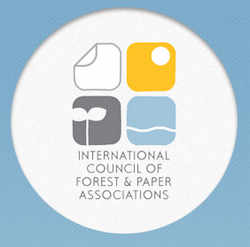 The International Council of Forest and Paper Associations (ICFPA) and its members welcome the signing of the landmark United Nations agreement to tackle climate change, set to take place on April 22. The agreement urges countries to implement policies that would allow them to keep a global temperature rise below 2 degrees Celsius. The global forest products industry has a highly significant role to play in the implementation of these targets.
The International Council of Forest and Paper Associations (ICFPA) and its members welcome the signing of the landmark United Nations agreement to tackle climate change, set to take place on April 22. The agreement urges countries to implement policies that would allow them to keep a global temperature rise below 2 degrees Celsius. The global forest products industry has a highly significant role to play in the implementation of these targets.
“The global forest products industry has made significant strides in reducing its carbon footprint, stocking carbon, and generating greenhouse gas removals – all helping to mitigate climate change”, said ICFPA President and Brazilian Tree Industry (Ibà) President Elizabeth de Carvalhaes. “This agreement is crucial to implementing some of the policies that consider biomass as carbon neutral when harvested from sustainably managed forests and to further recognize all positive contributions that forests and forest products provide in combating climate change.”
The inherently-renewable global forest products industry remains committed to mitigating climate change for the benefit of the green economy and society at large. ICFPA members have achieved an impressive 5% reduction in their greenhouse gas emissions intensity since 2010/2011 and 17% since the 2004-2005 baseline year (2015 ICFPA Sustainability Progress Report).
The European pulp and paper industry has been a global champion in mitigating greenhouse gas emissions. It has set itself in 2011 a clear vision of becoming carbon neutral by 2050 and since then, taken concrete steps to reach that goal,” said Jori Ringman, Acting Director General of Confederation of European Paper Industries (CEPI). “Thanks to responsible sourcing practices and sustainable forest management, the forest area is growing in Europe by an area of over 1,500 football pitches per day. CEPI is pleased to see development in the same direction globally”, he added.
The forest industry’s significant role in mitigating climate change was highlighted in the ICFPA-commissioned report Analysis of Forest Contributions to the INDCs by acclaimed researcher Paulo Canaveira. Having looked at the contributions of forests in the national targets of ICFPA member countries (INDCs) and global mitigation effort from 2020 onwards, the report concludes that many countries identify forests and the land-use sector as relevant to policies and measures implemented to meet their targets. Reducing emissions from deforestation, but also sustainable forest management, afforestation and reforestation are commonly mentioned as key mitigation practices. In some developing countries, they even constitute the country’s main contributions.
Other climate change mitigation efforts of the global forest products industry include supporting national and regional climate policies and programs; investing in technologies with low carbon footprints and ones that improve carbon sequestration; and developing bio-based technologies to find innovative ways to use wood fiber and substitutes for goods traditionally made from fossil fuels.
The ICFPA represents more than 30 national and regional forest and paper associations around the world. Together, ICFPA members represent over 90 percent of global paper production and more than half of global wood production.
For more information about the global forest and paper industry, visit www.icfpa.org
Former MEP Lena Ek takes on leadership to strengthen the role of the forest-based sector in the European bioeconomy
Chair of the Board of Södra and former Swedish Minister of Environment, she is the new Chairperson of the Board of the Forest-based Sector Technology Platform
 Lena Ek, former Member of the European Parliament (MEP) and Chairperson of the Board of the Södra Skogsägarna, is named the new Chair of the Board of the Forest-based Sector Technology Platform (FTP). She replaces Kaija Pehu-Lehtonen, Senior Vice President for Business Development in Metsä Fibre, who has been chairing FTP’s Board for the last two and half years.
Lena Ek, former Member of the European Parliament (MEP) and Chairperson of the Board of the Södra Skogsägarna, is named the new Chair of the Board of the Forest-based Sector Technology Platform (FTP). She replaces Kaija Pehu-Lehtonen, Senior Vice President for Business Development in Metsä Fibre, who has been chairing FTP’s Board for the last two and half years.
“Our objective is to advance the competitiveness of the whole sector by supporting European innovation and research”, stated Lena Ek after recognizing the substantial progress of the sector within the European research framework programmes, particularly Horizon 2020. “The forest-based sector will help to unlock Europe’s potential to make the transformation towards a biobased society. This fact should not be overlooked on the decisions about application of funding for research, innovation and technological development”, she added.
“It has been a privilege to work with such a competent Chair and strong industry representative as Kaija. We are truly grateful for her work and happy to see increased cooperation among industry, forest owners and researchers, as well as elevated success rates of proposals submitted by the sector,” stated FTP Managing Director Johan Elvnert. “We are excited with the new directions that FTP will take chaired by Lena Ek”, he concluded.
Lena Ek holds an honorary doctorate degree in Law and a distinct reputation in public affairs. Formerly, Lena served as Minister for the Environment of Sweden, Member of the European Parliament, Member of the Swedish Riksdag and hold prominent positions at the board of renowned political, scientific and industrial organisations. //FTP
About FTP – FTP is the European Technology Platform for the Forest-based Sector. Since 2005, when FTP was established, more than EUR 1 billion of public funding have been invested in cooperative research and innovation projects addressing the vision and improving the competitiveness and sustainability of the forest-based sector in Europe. The long-term strategy of FTP is established in its Vision 2030 to be implemented through the Strategic Research and Innovation Agenda for 2020. These documents were revised in 2013 and updated according to changing realities. The Confederation of European Paper Industries (CEPI), Confederation of European Forest Owners (CEPF), European State Forest Association (EUSTAFOR) and European Confederation of Woodworking Industries (CEI-Bois) are FTP shareholders.
About the European forest-based sector – The forest-based sector is one of Europe’s largest business sectors. It includes woodworking industries, pulp and paper industries as well as forest owners. It contributes some 8% of the EU’s total manufacturing added value, and sustainably manages forests covering 37% of the EU’s land area. It supports 3-4 million industrial jobs in sectors including transport, machinery, construction, instrumentation, information technology, chemicals and energy. The sector is also Europe’s biggest producer and user of bio-based energy.
Paper for Recycling Quality Control guidelines
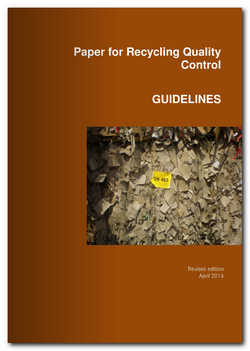 The European Standard EN 643, European list of standard grades of paper and board for recycling, is the basic document to be used by industry professionals in the buying and selling of paper for recycling. Interested parties should order the EN 643 from their respective national standardisation body . The standard was revised in 2013. It defines what the different grades of paper for recycling can and cannot contain as well as defining prohibited materials and unwanted materials. It also sets maximum tolerance levels by grade for unwanted materials.
The European Standard EN 643, European list of standard grades of paper and board for recycling, is the basic document to be used by industry professionals in the buying and selling of paper for recycling. Interested parties should order the EN 643 from their respective national standardisation body . The standard was revised in 2013. It defines what the different grades of paper for recycling can and cannot contain as well as defining prohibited materials and unwanted materials. It also sets maximum tolerance levels by grade for unwanted materials.
Specific agreements between buyer and supplier for grades with special specifications might still be necessary to meet individual requirements. However, general recommendations are needed to facilitate a common understanding of the standard.
To achieve greater harmonisation, to improve the implementation of the EN 643 Standard and to facilitate commercial relationships between paper mills and paper for recycling suppliers, these guidelines contain recommendations regarding paper for recycling quality controls for paper for recycling suppliers and paper mills.

